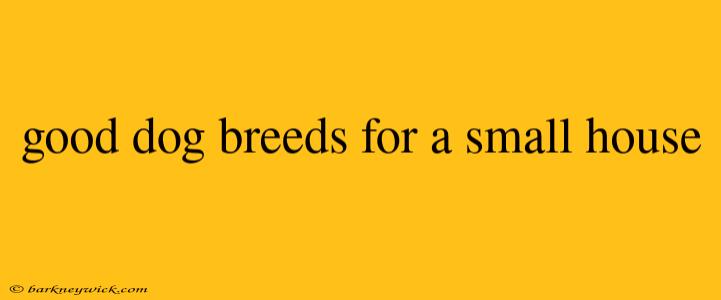Small House, Big Heart: Finding the Perfect Pup for Limited Space
I remember the day I brought home my first dog, a boisterous Golden Retriever named Sunny. I lived in a cozy one-bedroom apartment at the time, and I was convinced that having a big dog in a small space would be no problem. Boy, was I wrong! Sunny's boundless energy and love for chewing on furniture quickly made me realize that apartment living and large dogs don't always mix. Looking back, I wish I had done more research on dog breeds suited for smaller spaces.
Small House, Big Dog? Choosing the Right Breed
In my opinion, the key to finding the perfect dog for a small house is temperament, not just size. Some small breeds can be surprisingly high-energy and require lots of space to run around. Conversely, certain larger breeds can be surprisingly calm and adaptable to smaller environments.
Here are some factors to consider when selecting a dog breed for a small house:
- Energy Level: Do you prefer a calm, cuddly companion or a playful, energetic pal? A breed with moderate energy levels is often ideal for apartment living.
- Barking Tendencies: A dog that barks excessively can be a nuisance in a small space, especially if you have neighbors nearby. Consider breeds known for their quiet demeanor.
- Shedding: Some breeds shed more than others. If you're concerned about fur flying around your house, opt for a breed known for minimal shedding.
- Trainability: Dogs that are easy to train are generally better suited for apartment living. They're less likely to develop destructive behaviors from boredom or lack of stimulation.
Top Breeds for Small House Living:
1. Cavalier King Charles Spaniel
This breed is known for its gentle, loving personality and its love of cuddles. Cavalier King Charles Spaniels are relatively low-energy and happy to spend time lounging around.
Pros:
- Calm and affectionate
- Adaptable to smaller spaces
- Relatively low-shedding
Cons:
- Can be prone to health issues
- Requires regular grooming
Entity: The Cavalier King Charles Spaniel Club of America offers resources for potential owners, including breeder directories and breed information.
2. French Bulldog
These compact, muscular dogs are known for their playful personalities and quiet demeanor. French Bulldogs are relatively low-energy and happy to relax in a smaller space.
Pros:
- Calm and affectionate
- Relatively low-shedding
- Easy to train
Cons:
- Prone to heat sensitivity
- Can be stubborn
3. Boston Terrier
With their charming tuxedo-like appearance, Boston Terriers are known for their intelligence and playful nature. They're relatively low-energy and happy to be around their humans.
Pros:
- Adaptable to smaller spaces
- Relatively low-shedding
- Easy to train
Cons:
- Can be prone to health issues
- Can be stubborn
4. Greyhound
You might be surprised to find this breed on the list, but Greyhounds are actually surprisingly well-suited for apartment living. They're incredibly calm and enjoy lounging around.
Pros:
- Low-energy and calm
- Minimal shedding
- Relatively easy to train
Cons:
- Can be sensitive to loud noises
- May need regular exercise to prevent boredom
5. Pug
These small, wrinkly dogs are known for their playful personalities and love of cuddles. Pugs are relatively low-energy and happy to relax in a smaller space.
Pros:
- Calm and affectionate
- Relatively low-shedding
- Easy to train
Cons:
- Prone to health issues
- Can be stubborn
Tips for Small Space Dog Ownership:
- Mental Stimulation: Provide plenty of mental stimulation for your dog through puzzles, training sessions, and interactive toys.
- Regular Exercise: Even low-energy breeds need regular exercise. Take your dog for daily walks or play games indoors.
- Create Designated Spaces: Create designated spaces for your dog, such as a crate or bed, to help them feel safe and secure.
Conclusion:
Finding the right dog breed for a small house is about more than just size. It's about understanding the dog's temperament and needs. By carefully considering your lifestyle and choosing a breed that's well-suited to your space, you can enjoy a happy and fulfilling relationship with your canine companion, regardless of the size of your home.
